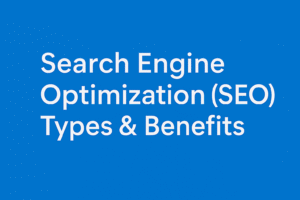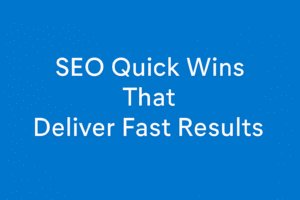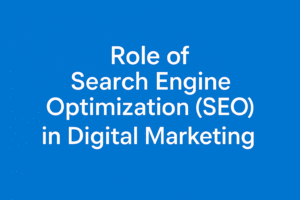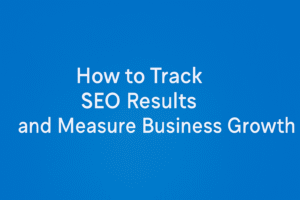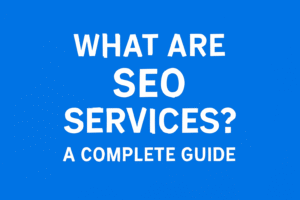Think about the last time you searched for a nearby restaurant, plumber, or salon. Chances are, you didn’t flip through a phone book — you opened Google. That’s the power of search engine optimization in digital marketing: it connects people to the businesses they need at the exact moment they’re looking.
For local businesses, showing up in those searches is the difference between getting a new customer or losing them to a competitor. That’s where local search engine optimization (SEO) comes in. It’s all about making sure your business appears when people in your area are searching for products or services you offer.
In this blog, we’ll break down what local SEO is, why it matters for search engine optimization for business, and the step-by-step SEO strategy you can use to put your brand on the map — literally.
What is Local Search Engine Optimization?
At its core, search engine optimization (SEO) is about improving your website so it shows up higher on search engines like Google. Local search engine optimization focuses specifically on helping your business appear in searches from people who are nearby.
For example, instead of competing for a broad keyword like “SEO services”, a local approach would target “SEO services in Dubai” or “best SEO agency Abu Dhabi”. This way, you are not just getting traffic but the right traffic — people who can actually visit your store, book an appointment, or use your services.
Local SEO is one of the main search engine optimization types, along with on-page, off-page, and technical SEO. The purpose of search engine optimization is to make you visible online, while local SEO ensures your business is discovered by the customers most likely to take action.
In short, if traditional SEO helps you compete across the internet, local SEO helps you stand out in your own community.
Why Local SEO Matters for Businesses
When someone searches for a product or service near them, they are usually ready to make a decision. That makes local searches some of the most valuable opportunities for any business. If your company shows up in those results, you have a much higher chance of turning searchers into customers.
Here are a few reasons why local search engine optimization is so important:
- Increases visibility where it counts: Local SEO makes sure your business appears on Google Maps and in local search results. This is often the first place people look when choosing a nearby option.
- Drives foot traffic and calls: Whether it is a restaurant, a dental clinic, or a home repair service, showing up in local searches leads to real-world visits and phone inquiries.
- Levels the playing field: You do not need a massive marketing budget to compete. A smart SEO strategy can help smaller businesses outperform bigger ones in local searches.
- Supports long-term growth: Investing in search engine optimization for business builds credibility over time. The more consistently you appear in searches, the more trust you earn with potential customers.
Many companies partner with SEO agencies to handle this work, but with the right approach you can start seeing benefits on your own. The key is to understand that SEO results take time. While you may see SEO quick wins from small changes, the real power of local SEO comes from steady effort.
Local SEO Strategy: How to Do It Step by Step
Local SEO works best when you follow a structured plan. Below are the key steps every business should take to improve their local presence and attract nearby customers.
Step 1: Do Keyword Research for Local SEO
Every strong SEO strategy starts with keywords. For local SEO, you want to focus on search terms people in your area actually use.
- Use tools like Google Keyword Planner, Ahrefs, or SEMrush to find relevant keywords.
- Check Google’s autocomplete suggestions and “People Also Ask” sections.
- Look at what keywords your competitors are ranking for.
For example, instead of just targeting “search engine optimization services”, go after “local search engine optimization services in Sharjah”. Start with a mix of SEO quick wins (low-competition keywords) and long-term terms that may take time to rank.
Step 2: Optimize Your Google Business Profile
Google Business Profile (formerly Google My Business) is the foundation of local SEO.
- Make sure your Name, Address, and Phone Number (NAP) are correct.
- Add your business hours, website, and services.
- Use photos and keep your profile updated.
- Add relevant keywords naturally in your business description.
Step 3: On-Page SEO – Optimize Your Website
Your website should clearly show search engines and users what you do and where you are.
- Include local keywords in titles, meta descriptions, and headers.
- Create dedicated landing pages for each location or service area.
- Add your NAP information consistently in the footer or contact page.
- Make sure your site loads fast and is mobile-friendly.
Step 4: Local Citations and Directory Listings
Citations are mentions of your business across the web (like Yelp, Yellow Pages, or local directories).
- Ensure NAP details match exactly everywhere.
- Add your business to trusted local directories.
- Remove duplicates or incorrect listings.
Step 5: Reviews and Reputation Management
Positive reviews build trust and improve your local rankings.
- Encourage customers to leave reviews on Google and other platforms.
- Respond to reviews (both positive and negative) to show engagement.
- Use natural keywords in responses when possible (e.g., “Thank you for choosing our SEO services”).
Step 6: Local Link Building and Content Strategy
Links are still a big ranking factor in SEO. For local businesses, focus on local relevance.
- Partner with nearby businesses for cross-promotion.
- Sponsor local events or charities to earn mentions and backlinks.
- Create blogs that combine SEO and content strategy with local focus, like “Top 5 Digital Marketing Trends in UAE.”
Step 7: Optimize for Mobile and Voice Search
Many local searches happen on smartphones and through voice assistants.
- Make sure your website is mobile-friendly and loads quickly.
- Use natural, conversational keywords for voice search (e.g., “best pizza place near me”).
- Add FAQs with local questions and answers.
SEO Takes Time vs. SEO Quick Wins
One of the biggest misconceptions about SEO is that results happen overnight. The truth is that search engine optimization for business is a long-term investment. Search engines need time to crawl your site, understand your content, and recognize your authority. That is why SEO takes time to get results.
However, that does not mean you cannot see improvements early on. By focusing on SEO quick wins, you can start building momentum while your long-term strategy develops.
Why SEO Takes Time
- Google evaluates many signals such as backlinks, content quality, and user engagement.
- Competitors are also working to rank for the same keywords.
- Trust and authority grow gradually, not instantly.
Think of SEO as planting a tree. You will not see shade right away, but the sooner you plant, the sooner it grows.
SEO Quick Wins You Can Try Now
- Update your title tags and meta descriptions with local keywords.
- Add your business to major directories and fix inconsistent NAP details.
- Create or update your Google Business Profile with accurate information and fresh photos.
- Ask a few happy customers to leave reviews online.
These smaller steps often show results faster, helping you gain visibility while the bigger SEO strategy works in the background. Over time, the combination of quick wins and steady improvements leads to stronger SEO results.
Measuring SEO Results
Once you start working on local SEO, the next question is: how do you know it is working? Tracking your progress is just as important as putting the strategy in place. The good news is that there are simple ways to measure your SEO results.
Tools to Track SEO Performance
- Google Analytics: Shows how much traffic is coming to your site and where it is coming from.
- Google Search Console: Helps you see which keywords you are ranking for and how often people click on your site.
- Google Business Profile Insights: Provides data on how customers interact with your listing, including:
- How many people searched for your business name vs. services you offer
- The keywords people used to find your profile
- How many clicked “Call,” “Directions,” or “Visit Website”
- Local SEO Tools: Platforms like Moz Local or BrightLocal track local rankings and citations.
Key Metrics to Watch
- Local Rankings: Are you showing up higher for your chosen keywords?
- Organic Traffic: Is the number of visitors from search engines increasing?
- Click-Through Rate (CTR): Are people clicking on your site when they see it in search results?
- Customer Actions: Calls, direction requests, and website clicks from your Google Business Profile.
- Reviews and Ratings: These influence both customer trust and search visibility.
Remember: SEO Takes Patience
While some SEO quick wins can show early improvements, meaningful growth usually happens over months. Consistent effort is what moves the needle. Partnering with reliable SEO services or SEO agencies can help you track and improve these results more effectively.
In short, measure progress regularly, celebrate small wins, and keep building your long-term plan.
Two Main Types of Search Engine Marketing
- SEO (Search Engine Optimization)
- Focuses on organic (unpaid) rankings.
- Results take time but bring long-term visibility.
- Builds trust ad authority because people often trust organic results more.
- PPC (Pay-Per-Click Advertising)
- Paid ads that appear at the top of search results.
- Can deliver instant traffic, but only while you keep paying.
- Useful for quick promotions or highly competitive keywords.
Most businesses benefit from using a mix of both. PPC provides speed, while SEO builds lasting growth.
Search Engine Optimization Types
Within SEO itself, there are different approaches:
- On-Page SEO: Optimizing your website content, titles, headers, and keywords.
- Off-Page SEO: Building backlinks and brand mentions from other sites.
- Technical SEO: Improving site speed, mobile-friendliness, and crawlability.
- Local SEO: Optimizing for searches in your geographic area.
Each type works together as part of a bigger SEO strategy. For example, seo your website with strong on-page content, then strengthen it with backlinks (off-page), fix any technical issues, and finally make sure your business shows up in local searches.
Common SEO Terms Every Business Should Know
If you are new to SEO, the terminology can feel overwhelming. Here are some of the most important SEO terms to understand.
- Keywords: The words or phrases people type into search engines to find information.
- SERP (Search Engine Results Page): The page you see after entering a search query.
- Backlinks: Links from other websites that point to your site, showing search engines that your content is trustworthy.
- CTR (Click-Through Rate): The percentage of people who click on your link after seeing it in search results.
- Meta Data: Information in your website’s code that tells search engines what a page is about. This includes the meta title (page title) and meta description (short summary shown in search results).
- NAP (Name, Address, Phone Number): Key business information that should be consistent across your website and listings.
- Local Pack: The box of local business listings that appears at the top of Google results, often with a map.
- Organic Traffic: Visitors who land on your website through unpaid search results.
- Bounce Rate: The percentage of visitors who leave your site after viewing only one page.
- Citations: Mentions of your business on other websites or directories, often including your NAP details.
Your Partner for Local SEO Success in the UAE
Knowing these terms makes it easier to understand how SEO works and helps you follow along when reading guides or working with SEO agencies. The more you know all about search engine optimization, the more confident you will feel in making decisions for your business.
Local SEO is no longer optional for businesses. It is the key to being discovered by customers in your area at the exact moment they are ready to buy. From keyword research and on-page optimization to reviews and Google Business Profile management, every step of your SEO strategy brings you closer to consistent growth.
Remember, SEO takes time to get results, but combining patience with smart SEO quick wins can put your business ahead of competitors. The purpose of search engine optimization is simple: to connect your business with the people who need it most.
At Infinitra Web, we specialize in delivering measurable SEO services and complete digital marketing solutions across the UAE. Whether your business is in Dubai, Sharjah, Abu Dhabi, Al Ain, Ajman, or Ras Al Khaimah, our team is here to help you improve visibility, attract the right audience, and grow with confidence.
If you are ready to take your online presence seriously, let’s build a tailored strategy that puts your business on the map — both digitally and locally.


